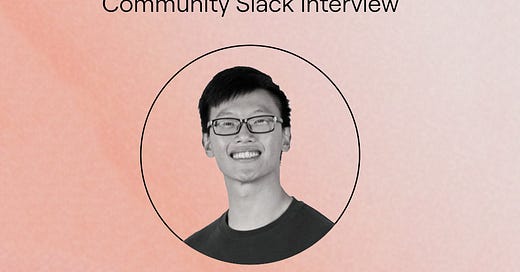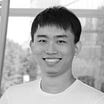Nucleate SG Slack interview with Lim Cheng Kai
We explored how a PhD career is more than just a thesis 😉
At the end of November, we held our very first Slack interview with a recent PhD-MBA graduate, Lim Cheng Kai. Cheng Kai’s stellar presence in both academic and industry spaces had us curious; we wanted to learn about how he managed his research while accumulating so many other meaningful experiences outside of academia.
Please find transcripts for the Slack interview with Lim Cheng Kai below! We made some edits to ensure clarity and coherence. Don’t worry, they’re kept minimal so that the authenticity of the conversation is preserved.
P.S. Questions from the participants were also incorporated into this transcript (thank you again for sending them in). With that, enjoy!
Nucleate SG: Hi everyone! Thank you for joining us for our very first Slack interview event. Thank you @Lim Cheng Kai again for offering his time to share his experiences with our Life Sciences community. We’re super excited to have you all online to share this moment with us, and we’re also super excited to learn from Cheng Kai!
Nucleate SG: Before we commence with the questions, we want to congratulate Cheng Kai for successfully defending his thesis last week. BIG congratulations to him for finally wrapping up his PhD work!!!
Lim Cheng Kai: Thanks everyone for the kind invite! Happy to be here and hopefully share some experiences that would be useful for people here 🙂
Academic and Career Journey
Nucleate SG: We can start with some introductions!
Nucleate SG: Can you please introduce yourself and provide a brief overview of your academic background?
Lim Cheng Kai: My name is Cheng Kai and I have a PhD-MBA from the National University of Singapore (just defended my thesis as mentioned by the kind folks at Nucleate :slightly_smiling_face:). My work lies in synthetic biology, specifically DNA data storage. My work has been published here and received quite a bit of publicity (GenEngNews, Vice). I also have experience in venture, where I was a venture fellow at Artis Ventures and sourced + diligenced multiple deals in the techbio space, as well as experience in BD/Community building in my roles as the Global Head of the Entrepreneurship Committee of the iGEM Foundation and with GDMC, a CDMO for cell and gene therapy startups.
Nucleate SG: What motivated you to pursue both an MBA and a PhD simultaneously?
Lim Cheng Kai: I wanted to move out from the usual academic work that a PhD path would entail, and I was immensely interested in working in companies/building startups in biotech - all of which would require not just scientific expertise but also knowledge of business fundamentals, which I believed that my MBA would offer. This thus led me to discover that NUS offered a PhD-MBA programme which I was immediately attracted to as it covered both aspects of the research and the commercialization/business side of things that I enjoyed and wanted to do.
Integration of Education and Skills
Nucleate SG: How did your MBA studies complement your PhD research, and vice versa?
Lim Cheng Kai: That's a very interesting question - I'd say that because the MBA was not done throughout the PhD, the question of how it impacted my PhD is not something that really happened until the actual MBA began (some time in the final year). I felt that the MBA really helped me to sharpen my 'pitch' - since most people in the MBA had no idea about my PhD work and the background, I had to be very clear with what my research was and how it would relate to them. On the other hand, the PhD also led me to think more 'scientifically' - which is a different way from how most MBAs approach problems and that also helped me get more analytical in my conclusions.
Nucleate SG: On this note, could you tell us about some specific soft and hard skills that you picked up through your MBA that you think are useful for someone trying to make a transition from academia to industry?
Lim Cheng Kai:
Soft skills:
Communicating your research in a manner that people can easily understand
How to be curious and network with others
Thinking in terms of collaborative efforts outside of purely research
Hard skills:
Financial knowledge (quite important for business oriented roles)
Industry Navigation and Networking
Nucleate SG: Were there any specific strategies or routines that helped you maintain a balance between coursework, research, and networking in the biotech industry?
Lim Cheng Kai: I felt that allocating time to each area on a frequent basis was the most important. I placed very little emphasis on coursework, as I felt that most graduate-level coursework was for enrichment rather than for grades, and thus I took the courses that I felt I could spend the least time on and instead focused on research and continued networking. I treated networking as ‘leisure’ rather than ‘work’, similar to how one would schedule time for exercising or going out with friends. There are multiple different events happening every week, and you don’t have to go for every single one - but just making the time to go for one or two every month would help a lot.
Nucleate SG: Can we talk about networking? Can you share any networking tips or experiences that were particularly beneficial in building connections within the industry?
Lim Cheng Kai: I think it's really about being genuinely curious about what people are doing - I have found that most people are very willing to share about what they work on, and you’d be surprised at how effective it is to just reach out to someone on LinkedIn and schedule a virtual zoom call. Continually practising this makes it easier as well, so continue to do so in multiple events with multiple people!
Nucleate SG: I'm very curious, did you have a mentor or role model who helped you navigate through the challenges entering the biotech scene?
Lim Cheng Kai: That's a very good question - I feel like I didn't have a specific mentor who helped me throughout my journey, and mentors came in and out at different times. I do know of people who had great mentors who worked closely with them throughout the journey, so that might work for you too - I just didn't feel like I had that one person throughout my entire journey but it was more a combination of different people who helped out at different parts of my career.
Biotech Career Insights and Future Vision
Nucleate SG: The biotech startup scene is quite a challenging one, how did you come to be interested in it?
Lim Cheng Kai: I started becoming interested in startups in undergrad, and really got interested in biotech after I started realising that my interest in biology could be coupled with my interest in startups. And I also realised that biology was something that I felt could truly impact people, and as I continued to look at what else I could do beyond academia, startups (where technology is usually at its newest and coolest) appealed significantly to me.
Nucleate SG: To continue on the previous question. Biotech is a rapidly evolving field. How do you stay updated on the latest trends and advancements, and do you have any recommendations for resources that others can leverage?
Lim Cheng Kai: That's a great question and something that I'm continually updating my sources on. There are a couple of ways but they boil down to essentially ABR (Always Be Reading):
News sources eg. Fiercebiotech, Genengnews, Endpoints, Statnews
Newsletters eg. Nucleate Artery, various substacks, nature/science newsletters (the journals)
Twitter/social media
Events/seminars
And of course constantly talking to people - you get a sense and triangulate your opinions from there!
Nucleate SG: Since many of our participants are academic trainees and are curious about options outside it, in your experience how important are academic achievements like citations and publications for industry employers?
Lim Cheng Kai: So for most industrial employers my impression is that the academic work only matters in 2 ways: 1) as a proof of work being done 2) whether your work is related to the job in question.
If the job is not an academic/research oriented one, then I believe that it really doesn't matter too much. Having said that, it's more like a checkbox for the employer to see that you have something being done in your academic work. In my opinion industry employers would rather see hard skill sets e.g. whether you have experience with a particular instrument/technique eg. mass spectrometry rather than the specific details of your paper. I don't know anyone who cares about citation count so...
Nucleate SG: Some of the participants have come up to us and told us that they are impressed by your portfolio. Could you tell us how you landed some of your internships?
Lim Cheng Kai: Most of my internships were gotten through some form of networking - e.g. My work with GDMC was because I reached out to another firm and they referred me to GDMC to start, and Artis was because I knew someone who did the fellowship earlier and I asked him about it. But actually landing the internship takes quite a bit of prep work in that I had to have some knowledge of what needed to be done, and crucially being enthusiastic and open to learning. Feel free to ask me directly on LinkedIn if you need more specific information!
Nucleate SG: In Nucleate SG we are interested to learn from the biotech scene overseas, as a Business Development Intern at Sigrid Therapeutics AB through the NUS Overseas College Scholarship Program, you had the opportunity to work overseas. How did this experience in Sweden compare to what you have experienced in the local biotech landscape?
Lim Cheng Kai: So my personal experience in Sweden was slightly tangential to the straight 'biotech' that people usually associate with - it was more towards medical devices. I felt like it was harder to break into the scene there because the Swedish community was more niche and specific, and in fact still very 'basic science' oriented compared to Singapore. I felt that Singapore had a more active biotech scene. Having said that, perhaps going back to Sweden now I would be able to engage more having become more familiar with biotech over the years since then.
Nucleate SG: We are also interested in building community in Singapore. What kind of community building activities do you think we could have more of here?
Lim Cheng Kai: I think there are multiple ways to build communities based on my experience thus far. One way is through hosting gatherings - I used to host small (5 person) dinners with PhD students to get them to interact with one another, which I found to be really nice and judgement free. Another way is to do things like workshops and hackathons which people can rally around. Another last thing would be to do casual hikes/climbing/other activities which can rally people around. And I think one last thing that could be done is also to engage more with different societies (e.g. Biotech Connection) to start fostering the connection between graduate students and industry folks.
Nucleate SG: You’ve had so many experiences in different places, could you comment on some of the big industry trends you’ve observed recently? We saw you chatting up the speakers from the Emerging Global Trends in Biomedtech held by SGinnovate just now. Any new take you would like to share?
Lim Cheng Kai: I think AI is gonna be massive for knowledge workers as a whole - be it in tech, consulting or biotech. Being able to understand its strengths and its weaknesses, as well as how to properly utilise it in various aspects, would be crucial to us all as people graduating into the industry. (eg. AI in drug discovery - what differentiates one company from another, how to understand that)
Nucleate SG: Wow, an hour has passed so quickly! Final question.
Nucleate SG: Where do you envision yourself in the future?
Lim Cheng Kai: That's a tough question - I'll cop out by saying that I don't envision a specific place, but I know that I'd like to be doing something I enjoy, and helping people in the process (be it contributing to science, developing a product or otherwise). Definitely still staying in biology but I'm going to be agnostic to what I'll actually be doing specifically!
Nucleate SG: Seems like there is a lot to learn about how we can increase our exposure to the kinds of opportunities that are available to us while going through graduate school. It has been a pleasure to learn about how a PhD journey can be experienced. So much of our own narratives are influenced by the personal stories of other people; we hope that Cheng Kai’s story has inspired you to build a similar story of your own.
Nucleate SG: Thank you ALL so much for being present here with us! We at Nucleate SG believe in building a stronger biotech community so we are beyond happy that so many of you are open to engaging with us here tonight. Feel free to reach out to any of us here. We’re more than happy to hear from you.
Lim Cheng Kai: Thanks for having me and hope to have helped! Feel free to connect with me on LinkedIn - but please write a note when you connect so I know who you are/where you found me from. (PS you should do this for everyone you'd like to connect to, makes a massive difference)!
Lim Cheng Kai: Shoutout to the Nucleate team @Leong Kim Whye (Nucleate SG) @Liyana Ayub Ow Yong (Nucleate SG) @Sam Wong (Nucleate SG) @Ivan Seah (Nucleate SG) for engaging and facilitating this! Was super fun and thank you all for the work that yall do for the community here!
We will have more of such interviews in the future! Tell us who you would like to hear from and we'll try our best to have them onboard. Do help us spread the word by forwarding this link to join our Life Sciences Slack community and make it a bigger one!







